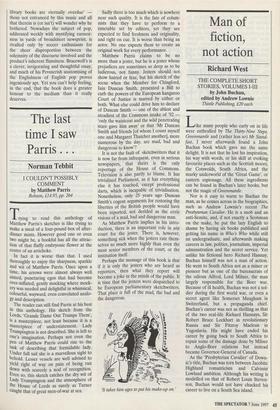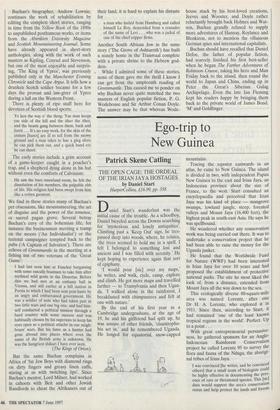Man of fiction, not action
Richard West
THE COMPLETE SHORT STORIES, VOLUMES I-III by John Buchan, edited by Andrew Lownie Thistle Publishing, £20 each Like many people who early on in life were enthralled by The Thirty-Nine Steps, Greenmantle and (rather less so) Mr Stand- fast, I never afterwards found a John Buchan book which gave me the same delight. It is not that he lost his inspiration, his way with words, or his skill at evoking favourite places such as the Scottish moors, the Cotswolds, South Africa, and the murky underworld of the 'Great Game', or eastern espionage. All these ingredients can be found in Buchan's later books, but not the magic of Greenmantle.
Nor is it easy to warm to Buchan the man, as he comes across in the biographies, such as Andrew Lownie's recent The Presbyterian Cavalier. He is a snob and an anti-Semite, and, if not exactly a Scotsman on the make, he put the lazy English to shame by having six books published and getting his name in Who's Who while still an undergraduate, and afterwards making careers in law, politics, journalism, imperial administration and the secret service. Yet unlike his fictional hero Richard Hannay, Buchan himself was not a man of action. He went to South Africa not as a miner or pioneer but as one of the bureaucrats of the odious Alfred, Lord Milner, the man largely responsible for the Boer war. Because of ill health, Buchan was not a sol- dier during the first world war, or even a secret agent like Somerset Maugham in Switzerland, but a propaganda chief. Buchan's career was not as thrilling as that of the two real-life Richard Hannays, Sir Robert Bruce Lockhart in revolutionary Russia and Sir Fitzroy Maclean in Yugoslavia. His might have ended his career by going back to South Africa to repair some of the damage done by Milner to Ang,lo-Boer relations but instead became Governor-General of Canada.
As the 'Presbyterian Cavalier' of Down- ie's title, Buchan was torn between Jacobite Highland romanticism and Calvinist Lowland ambition. Although his writing is modelled on that of Robert Louis Steven- son, Buchan would not have chucked his career to live on a South Sea island. Buchan's biographer, Andrew Lownie, continues the work of rehabilitation by editing the complete short stories, ranging in time from the Yellow Book of the 1890s to unpublished posthumous works, or items from the Aberdeen University Magazine and Scottish Mountaineering Journal. Some have already appeared in short-story anthologies, along with the work of such masters as Kipling, Conrad and Stevenson, but one of the most enjoyable and surpris- ing, 'The King of Ypres', was previously published only in the Manchester Evening Chronicle and the Cape Argus. It tells how a drunken Scotch soldier became for a few days the provost and law-giver of Ypres during a lull on the Western Front.
There is plenty of ripe stuff here for devotees of Scottish blood sports:
Ye ken the way o' the thing. Yae man keeps yae side of the hill and the ither the ither, and the beasts gang between them, back and forrit ... It's no easy work, for the skin of the craturs [hares] are ill to tell from the snowy ground and a man takes to hae a gleg afore he can pick them out, and a quick hand ere he can shoot.
The early stories include a grim account of a game-keeper caught in a poacher's trap, and a shepherd dying alone in his hut without even the comforts of Calvinism:
He saw the bare moorland room, he felt the dissolution of his members, the palpable ebb of life. His religion had been swept from him like a rotten garment.
We find in these stories many of Buchan's pet obsessions, like mountaineering, the art of disguise and the power of the temenos, or sacred pagan grove. Several betray Buchan's envy of the bohemian life, for instance the businessman meeting a tramp on the moors ('An Individualist') or the teetotal campaigner tempted back to the pubs CA Captain of Salvation'). There are echoes of Greenmantle in the meeting at a fishing inn of two veterans of the 'Great Game':
I had last seen him at Funchal bargaining with some rascally boatmen to take him after mythical wild goats in the Desertas. Before that we had met at an embassy ball in Vienna, and still earlier at a hill station in Persia to which I had been sent post-haste by an angry and embarrassed government. He was a soldier of note who had taken part in two little wars and one big one; and had him- self conducted a political mission through a hard country with some success and was habitually chosen by his superiors to keep his eyes open as a political attaché in our neigh- bours' wars. But his fame as a hunter had gone abroad into places where even the name of the British army is unknown. He was the hungriest shikari I have ever seen.
(The Kings of Orion).
But the same Buchan complains in Africa of 'fat Jew Boys with diamond rings on dirty fingers and greasy linen cuffs, staring at us with twitching lips'. Since Buchan's mentor, Lord Milner, had worked in cahoots with Beit and other Jewish Randlords to cheat the Afrikaners out of their land, it is hard to explain his distaste for
a man who hailed from Hamburg and called himself Le Roy, descended from a crusader of the name of Levi . . . who was a jackal of one of the chief copper firms.
Another South African Jew in the same story (`The Grove of Ashtaroth') has built a stately home in the Transvaal complete with a private shrine to the Hebrew god- dess.
„ While I admired some of these stories, none of them gave me the thrill I know I can get from the umpteenth reading of Greenmantle. This caused me to ponder on why Buchan never quite matched the two masters of English popular fiction, P. G. Wodehouse and Sir Arthur Conan Doyle. The answer may be that whereas Wode- house stuck by his best-loved creations, Jeeves and Wooster, and Doyle rather reluctantly brought back Holmes and Wat- son, Buchan grandly refused to supply more adventures of Hannay, Roylance and Blenkiron, not to mention the villainous German spies and international capitalists.
Buchan should have recalled that Daniel Defoe, the father of popular fiction, had scarcely finished his first best-seller when he began The Farther Adventures of Robinson Crusoe, taking his hero and Man Friday back to the island, then round the world to Japan and China, ending up in Peter the Great's Siberian Gulag Archipelago. Even the late Ian Fleming kept his readers happy by bringing them back to the private world of James Bond, 'M' and Goldfinger.











































































 Previous page
Previous page